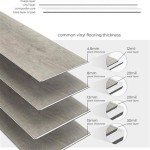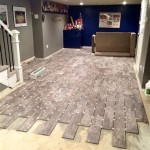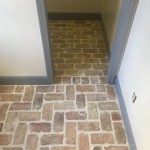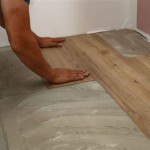Pros and Cons of Floating Vinyl Flooring
Floating vinyl flooring has gained popularity as a durable and versatile flooring option. This type of flooring consists of planks or tiles that are clicked or locked together over an underlayment without the need for adhesives. While floating vinyl flooring offers numerous advantages, it is essential to consider both its benefits and drawbacks before making a decision.
Advantages of Floating Vinyl Flooring
- Durability: Floating vinyl flooring is highly durable and resistant to scratches, dents, and moisture. It is an excellent choice for high-traffic areas and can withstand wear and tear.
- Waterproof: Vinyl flooring is 100% waterproof, making it suitable for areas prone to spills or moisture, such as bathrooms, kitchens, and basements.
- Easy Installation: Floating vinyl flooring is relatively easy to install. It can be installed by DIY enthusiasts or professionals over most existing subfloors.
- Variety of Styles: Floating vinyl flooring comes in a wide range of styles and designs, including wood-look, stone-look, and abstract patterns. This versatility allows it to complement various décor styles.
- Comfort: Vinyl flooring is cushioned and provides a comfortable walking surface compared to harder flooring materials like tile or laminate.
Disadvantages of Floating Vinyl Flooring
- Temperature Sensitivity: Vinyl flooring can expand or contract with extreme temperature fluctuations. This can cause the seams to become visible or the flooring to buckle.
- Subfloor Requirements: Floating vinyl flooring requires a smooth, level subfloor. Uneven subfloors may result in an uneven flooring surface.
- Cost: While floating vinyl flooring is generally affordable, it can be more expensive than other flooring options, such as laminate or carpet.
- Noise: Floating vinyl flooring can be noisy when walked on, especially if not installed properly with an adequate underlayment.
- Difficult Repairs: If a plank or tile becomes damaged, it can be challenging to replace it without removing the entire floor.
Conclusion
Floating vinyl flooring offers numerous advantages, including durability, waterproofness, ease of installation, and variety of styles. However, it is essential to consider its potential drawbacks, such as temperature sensitivity, subfloor requirements, cost, noise, and repair difficulties. By weighing the pros and cons carefully, homeowners can make an informed decision that best meets their needs and preferences.

Luxury Vinyl Flooring Pros And Cons I Never Thought We D Do This To Our Main Floor Diy Life

Floating Floors Vs Non What Gives

Vinyl Vs Laminate Flooring Pros Cons And Differences Forbes Home

Floating Floors Pros And Cons Floorset

What Is Rigid Core Flooring And Should You Get It

Glue Down Vs Floating Vinyl Plank North Eastern Group Realty

Vinyl Flooring Pros And Cons Forbes Home

Pros And Cons Of Floating Vs Glue Down Luxury Vinyl Flooring

Floating Floor Types Pros And Cons Resand Co

Luxury Vinyl Flooring Pros And Cons I Never Thought We D Do This To Our Main Floor Diy Life
See Also







